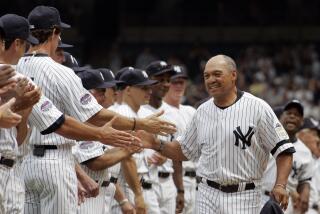Militant Maggie Hathaway Never Quits Fighting for Her Cause
- Share via
Years of crusading for the integration of golf culminated for Maggie Hathaway in 1971, when the first African American invited to play the Masters was announced at the first tee. Lee Elder hit his drive. She fainted.
Awaking minutes later in the medical facility on the Augusta National course, she discovered that in the bed next to her was Gary Player, a South African golfer whose participation in a golf tournament she had once protested.
That is among many stories Hathaway tells about her years as an actress who often served as a double for Lena Horne, a co-founder of the Beverly Hills-Hollywood chapter of the NAACP, along with Sammy Davis Jr., and a golfer.
A majority of those stories she wrote in more than three decades as the golf columnist for the Sentinel, a Los Angeles newspaper that continues to publish her work as a special contributor.
Hathaway, who will not give her age because “I don’t look it,” says she began playing golf after winning a bet with heavyweight boxer Joe Louis in 1955.
“I went out to Griffith Park to reprimand him because he was playing in pro-ams when truly excellent black golfers like Bill Spiller weren’t allowed to play,” she says.
“I caught up with him at No. 8, which was a short par three. He hit down to the green, and I told him, ‘Anybody could do that.’ He said, ‘OK, you try. If you hit the green, I’ll buy you a bag of golf clubs.’ I hit the green with the first shot I ever took in my life, and he bought me the clubs.”
Hathaway has been playing ever since, well enough at one point to have a 14 handicap. But she found soon after starting that she couldn’t play on many courses in Southern California and that most amateur and professional tournaments were exclusively for whites. She became well known for her efforts to change that.
“I’m a militant,” she says. “The only thing I’ve ever regretted is that I picketed Bing Crosby’s tournament. I found out later that he was trying to help blacks get into the tournament, but he couldn’t do anything with the PGA.”
Until 1961, the PGA of America excluded anyone but Caucasians from its membership.
In recent years, Hathaway has been active in organizing opportunities for young minorities to play and has received financial help from PGA players, including Jack Nicklaus.
She and Player have been friends since they shared the Augusta medical facility.
“He’s done a lot for young black golfers that people don’t know about,” she says. “He has to work harder than most to prove he’s not a racist.”
The headline on her most recent article for the Sentinel was “Have We Built Enough Bridges for Tiger?”
“I just hope the press doesn’t put too much pressure on him by constantly having a camera in his face or by asking too many personal questions--as they have done so far,” she wrote.
She will be among them next month, when she covers her second Masters for the Sentinel.
More to Read
Go beyond the scoreboard
Get the latest on L.A.'s teams in the daily Sports Report newsletter.
You may occasionally receive promotional content from the Los Angeles Times.










